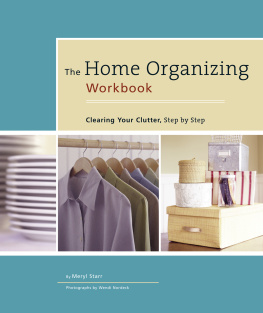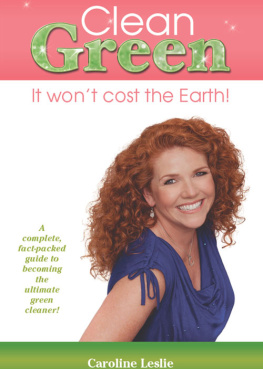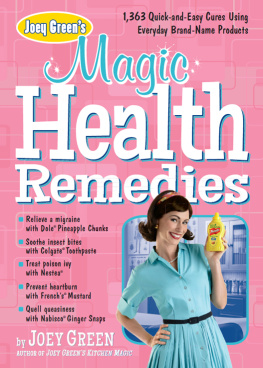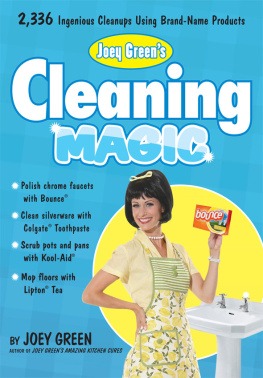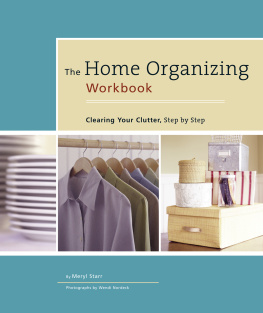W hen I was a kid, my grandfather owned a furniture store called Furniture World in Miami, Florida. My father worked at the furniture store and would occasionally take me to work with him. To me, spending the entire day with my father at the furniture store was a real treat. Id hide between boxes of furniture in the dark warehouse, get lost in a maze of furniture in the showroom, and play with paper clips, mess around with rubber stamps and ink pads, and pound away at the keys of a manual typewriter in the back office to test five sheets of carbon paper at the same time.
We would start the day in the warehouse, where a crew of burly, kind-hearted men would load furniture onto the truck to be delivered to customers that day. But before they moved the furniture onto the truck, Billy, Earl, Armando, Lee, and my father would thoroughly examine the furniture for any damage. If they discovered any defects, they would quickly repair the marred furniture using an odd assortment of products on the workbench beneath a wall decorated with centerfolds of pinup girls from a bygone era. In seconds, theyd reattach legs to chairs with Elmers Glue-All. Theyd cover up scratches in a dining room table with Crayola Crayons. Theyd lubricate the runners on dresser drawers with a bar of Ivory Soap. Id stand nearby speechless, watching in awe, dazzled by their inventiveness.
To me, everything that happened during those early morning hours in the Furniture World warehouse gave me a wonderful glimpse into a secret world of American ingenuity. These guys could fix anything. Aside from knowing all the tricks of the trade, my father was also exceptionally handy at home. On Sunday afternoons, when he made repairs around the house, I served as his assistant (compelled by my rank as the eldest of four children), handing him whatever tool he requested or running to the workbench in the garage for whatever tool he had forgotten. I not only learned the difference between a pair of pliers and a wrench, but as a keen observer, I beared witness to some amazing shortcuts when it comes to home repair. My father taught me to wrap a strip of Scotch Transparent Tape around the drill bit to create a flag to know when to stop drillingso I wouldnt accidentally drill a hole through the other side of the wood. He showed me how to lubricate the blade of a handsaw with a bar of Ivory Soap. And he demonstrated how to slow the drying time of plaster of Paris by simply mixing in some Heinz White Vinegar.
Whenever anyone asks me how I come up with all these tips, I usually explain that I was asked to come up with alternative uses for Nestea Iced Tea Mix in a meeting while working for an advertising agency in New York City. One of the account guys in that meeting said he had gotten badly sunburned one summer day, went home, emptied a jar of Nestea powdered mix into his bathtub, filled the tub with water, and soaked in it. We all looked at him like he was crazy, but he swore that the tannic acid in the tea had relieved his sunburn pain. That story inspired me to contact the manufacturers to find out other alternative uses for the many brand-name products we all know and love. But as I continued researching these tips, I realized that I had learned many of them by tagging along with my father, who proudly recalled that in college he had poured Coca-Cola over the battery terminals under the hood of his stalled car to fizz away the corrosion and get the ignition to start up.
Over the past twenty years, Ive put many of these tips to work. As a homeowner, Ive painted nearly every room in our home, removed wallpaper from walls, tiled bathroom floors, deodorized pet urine stains from carpet, installed shelves, repaired faucets and toilets, and best of all, Ive wallpapered one of my daughters bedrooms together with my father. Ive fixed a broken dishwasher with Tang, cleaned oil spills from our driveway with Coca-Cola, removed water stains from wooden furniture with Miracle Whip, and cleaned grape juice stains from carpet with Canada Dry Club Soda. I owe it all to my father.
And so, I decided to put all these incredibly quirky yet practical tips together in one handy book, so you too can use brand-name products you already have in your kitchen, bathroom, laundry room, and garage to fix things around the housesaving time, money, and aggravation. But I had to know more. I locked myself in the library and researched hundreds of helpful ideas, contacted companies to obtain their secret files, talked with dozens of home improvement experts, and sifted through hundreds of e-mails that I receive through my website, www.wackyuses.com.
I uncovered some astonishingly helpful hints. Leggs Sheer Energy Panty Hose strains lumps from a can of paint. Pam Cooking Spray lubricates the sliding racks in a dishwasher. Efferdent can clear a clogged drain. Wilson Tennis Balls erase scuff marks from floors. Listerine kills mold and mildew in a shower stall. Purell Instant Hand Sanitizer cleans tomato sauce stains from the insides of Tupperware.
This book is the result of my obsessive journey into the world of home improvement. But its also a happy trip down memory lane into the recesses of the Furniture World warehouse, where my father first taught me the tricks of the trade. Thank you, Dad, for teaching me everything I know.
Cooking
- Forster Toothpicks. Identify rare, medium, and well-done steaks on your barbecue grill by using colored Forster Toothpicks to mark steaks on the barbecue.
- Maxwell House Coffee. A clean, empty Maxwell House Coffee can doubles as an excellent disposable pot to be used on the grill to cook bratwursts in beer.
- Morton Salt. After barbecuing, sprinkle Morton Salt over the smoldering charcoal to prevent the embers from flaring up into a roaring fire again.
Grill
- Arm & Hammer Baking Soda. To clean a barbecue grill, make a paste by mixing equal parts Arm & Hammer Baking Soda and water, apply with a wire brush, wipe clean, and dry with a cloth.
- Cascade, Glad Trash Bags, and Parsons Ammonia. To clean caked-on grease from an outdoor barbecue grill, place the grill in a Glad Trash Bag and add one cup Parsons ammonia, one cup Cascade dishwasher detergent, and two gallons hot water. Secure the bag closed. (The fumes from the ammonia help weaken the bond of the baked-on food and grease.) Let sit for forty-five minutes, then hose down the grill and wipe clean.









